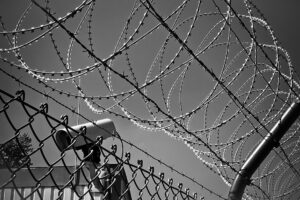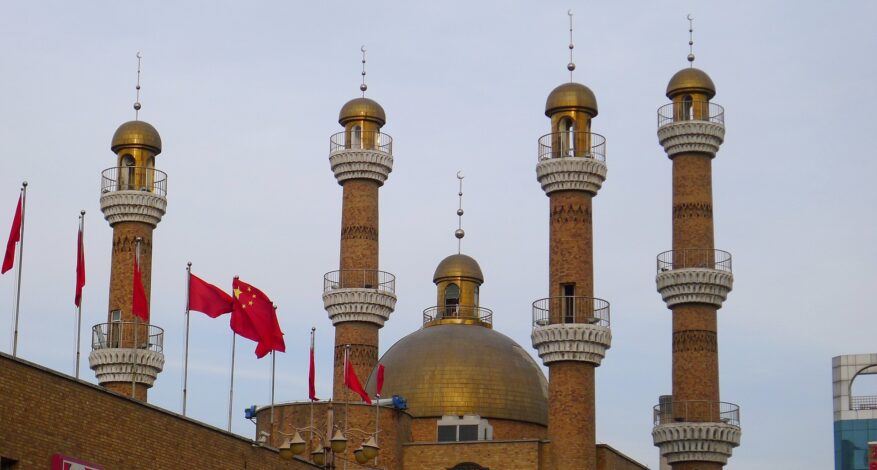THE PANOPTIC GAZE OF CHINA
Surveillance is often praised in the name of security, but when the gaze of an authoritarian state penetrates every layer of a person’s life, reality starts to take the shape of a literary dystopia. The all-seeing surveillance system in the Chinese region of Xinjiang, however, is no fiction: with constant police patrols and high-tech cameras scrutinising its citizens’ every move, Xinjiang has turned into an experiment for mass state surveillance, and the Uighur people, a Turkic and predominantly Muslim minority, are its main targets.
 Since 2017, China has been accused of unlawfully locking up Uighurs into detention camps where they are subjected to indoctrination with Communist Party’s ideology, forced labour in large cotton fields in Xinjiang, and severe abuses including torture, rape, and female sterilisation. To this date, several statistics have estimated that more than a million Uighurs have been imprisoned. However, the Chinese government has rejected all allegations, defending the camps as “re-education” centres aimed at preventing terrorist uprisings and extremist behaviour. They also claimed that people entered them voluntarily. Yet, the disturbing footage of individuals being led on trains, handcuffed and blindfolded, tells a different story.
Since 2017, China has been accused of unlawfully locking up Uighurs into detention camps where they are subjected to indoctrination with Communist Party’s ideology, forced labour in large cotton fields in Xinjiang, and severe abuses including torture, rape, and female sterilisation. To this date, several statistics have estimated that more than a million Uighurs have been imprisoned. However, the Chinese government has rejected all allegations, defending the camps as “re-education” centres aimed at preventing terrorist uprisings and extremist behaviour. They also claimed that people entered them voluntarily. Yet, the disturbing footage of individuals being led on trains, handcuffed and blindfolded, tells a different story.
Power to control
But even outside those nightmarish camps, Uighurs do not enjoy their right to freedom: the oppressive state surveillance has provided a tool for the government to monitor and control them, making privacy an unaffordable luxury. In Xinjiang, authorities are instructed to collect specific biometrical data on Uighurs, including DNA samples, voice records, and every detail that might confirm a person’s identity. Then, they are used to implement a new, futuristic system of surveillance cameras, which are placed in every corner of the region. An executive at Leon, one of the tech companies that design them, told an undercover reporter: ‘when you see a camera, you think it’s just a camera, but what you don’t know, as you walk past, is that it records all your information and analyses it, including your facial expressions and behaviours’.
These surveillance devices recognise the facial complexion of Uighurs — which is distinct from that of Han Chinese, the ethnic majority — and search for hints of “threatening behaviour”, which can be as simple as looking nervous or walking past the camera too fast. Then, the computer divides people into three categories: “normal”, “of concern”, and “dangerous”. Those deemed dangerous are doomed to deportation into the camps, with no explanations and no right to a fair trial, or any trial at all.
 ID checks are also a part of the daily life of Uighurs: as a reporter from the Wall Street Journal has said, ‘to be in Xinjiang means being checked every day, multiple times a day. When you go to a market when you drive a car when you take a train. Even your smartphone is checked’. And identity determines privilege: the same news video reported that ordinary activities such as purchasing a kitchen knife (which falls into the category of “dangerous goods”) are restricted according to factors such as ethnicity and religion. Another example is travel: the BBC had reported on travel restrictions for Uighurs and passport confiscation as early as 2016, and many of those living abroad have claimed that their family members have been deported to the camps upon their return to China.
ID checks are also a part of the daily life of Uighurs: as a reporter from the Wall Street Journal has said, ‘to be in Xinjiang means being checked every day, multiple times a day. When you go to a market when you drive a car when you take a train. Even your smartphone is checked’. And identity determines privilege: the same news video reported that ordinary activities such as purchasing a kitchen knife (which falls into the category of “dangerous goods”) are restricted according to factors such as ethnicity and religion. Another example is travel: the BBC had reported on travel restrictions for Uighurs and passport confiscation as early as 2016, and many of those living abroad have claimed that their family members have been deported to the camps upon their return to China.
But the surveillance state has gone even further, overstepping the boundaries between public and private spaces: QR codes are glued to the front doors of Uighur homes, readily available for policemen to check all details of the household, and to enquire about any potentially suspicious visitor. Moreover, since 2017, the national program “Pair up and become family” has been sending Han Chinese officials to live in the homes of Uighurs for short but repeated periods. These people, who call themselves “relatives”, eat and sleep under the same roof of their helpless hosts, who have denounced the forced intrusion as a form of micro-espionage. Like a modern Argus Panoptes, the never-blinking eyes of the Chinese government are everywhere.
Last March, the US accused China of genocide, an allegation echoed by the voices of survivors: ‘their goal is to destroy everyone’, a former detainee told the BBC. In what is possibly the strictest and definitely the most advanced surveillance state in the world, the erosion of Uighur identity begins with the most ordinary daily activities being turned into grounds for suspicion. Yet, while cameras incessantly observe the streets, the process of “re-education” of Uighurs takes place behind closed doors.


